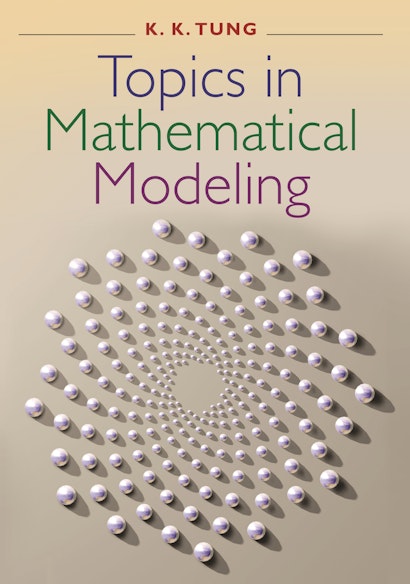Topics in Mathematical Modeling is an introductory textbook on mathematical modeling. The book teaches how simple mathematics can help formulate and solve real problems of current research interest in a wide range of fields, including biology, ecology, computer science, geophysics, engineering, and the social sciences. Yet the prerequisites are minimal: calculus and elementary differential equations. Among the many topics addressed are HIV; plant phyllotaxis; global warming; the World Wide Web; plant and animal vascular networks; social networks; chaos and fractals; marriage and divorce; and El Niño. Traditional modeling topics such as predator-prey interaction, harvesting, and wars of attrition are also included. Most chapters begin with the history of a problem, follow with a demonstration of how it can be modeled using various mathematical tools, and close with a discussion of its remaining unsolved aspects.
Designed for a one-semester course, the book progresses from problems that can be solved with relatively simple mathematics to ones that require more sophisticated methods. The math techniques are taught as needed to solve the problem being addressed, and each chapter is designed to be largely independent to give teachers flexibility.
The book, which can be used as an overview and introduction to applied mathematics, is particularly suitable for sophomore, junior, and senior students in math, science, and engineering.
K. K. Tung is Professor and Chairman of the Department of Applied Mathematics at the University of Washington. He is the author or coauthor of more than eighty research papers in atmospheric sciences and applied mathematics, and editor or chief editor of two journals in these fields.
"This beautifully produced book should provide a joyful and stimulating reading experience for any layman who is curious about real-life events in the context of mathematical modelling, and it provides an excellent entry point to more advanced areas such as mathematical biology or climate modelling."—Z. Q. John Lu, Significance
"What do global warming, predator-prey interactions, and the World Wide Web have in common? All of these disparate phenomena can be modeled using mathematics. In Topics in Mathematical Modeling, K. K. Tung demonstrates math¹s relevance to problems of current research interest in biology, ecology, computer science, geophysics, engineering, and the social sciences."—Scientific American Book Club
"[T]his is a good introductory book about the nature and purpose of mathematical modeling. The topics chosen and the way in which they have been motivated and presented will help a wide range of students to 'see the point' and thereby arouse and stimulate their confidence about their mathematical problem solving skills."—Bob Anderssen, Australian Mathematics Society
"I was so impressed by the breadth of examples contained in its 336 pages that I immediately set about using it to update one of my own undergraduate courses. . . . A wonderful source book for all kinds of undergraduate mathematical activities. . . . Extremely clear. . . . It is highly recommended."—Chris Howls, Times Higher Education
"Tung's preface shows that he is a dyed-in-the-wool teacher of considerable talent whose only mission is to show the student how to take raw empirical data and turn it into a mathematical paradigm that can be analyzed. His prerequisites are solid but minimal: calculus and a smattering of ordinary differential equations (ODEs). He is wise to provide an appendix with a quick treatment of ODEs for those whose background is deficient. Tung also describes in the preface a clear path for those who wish to avoid the differential equations altogether. Tung covers some of the usual modeling topics but also many others that are surprising and refreshing."—Steven G. Krantz, UMAP Journal
"This book has a refreshing style that should appeal to undergraduates. Indeed, the author has produced a textbook that might well achieve his goal of teaching applied mathematics without those being taught noticing!"—Andrew Wathen, University of Oxford
"With courses in mathematical modeling getting ever more popular, this book will make a valuable addition to the subject. It deals with topics that should be appealing even to students not majoring in math or science, and the level of mathematical sophistication is carefully increased throughout the book."—Henrik Kalisch, University of Bergen, Norway

